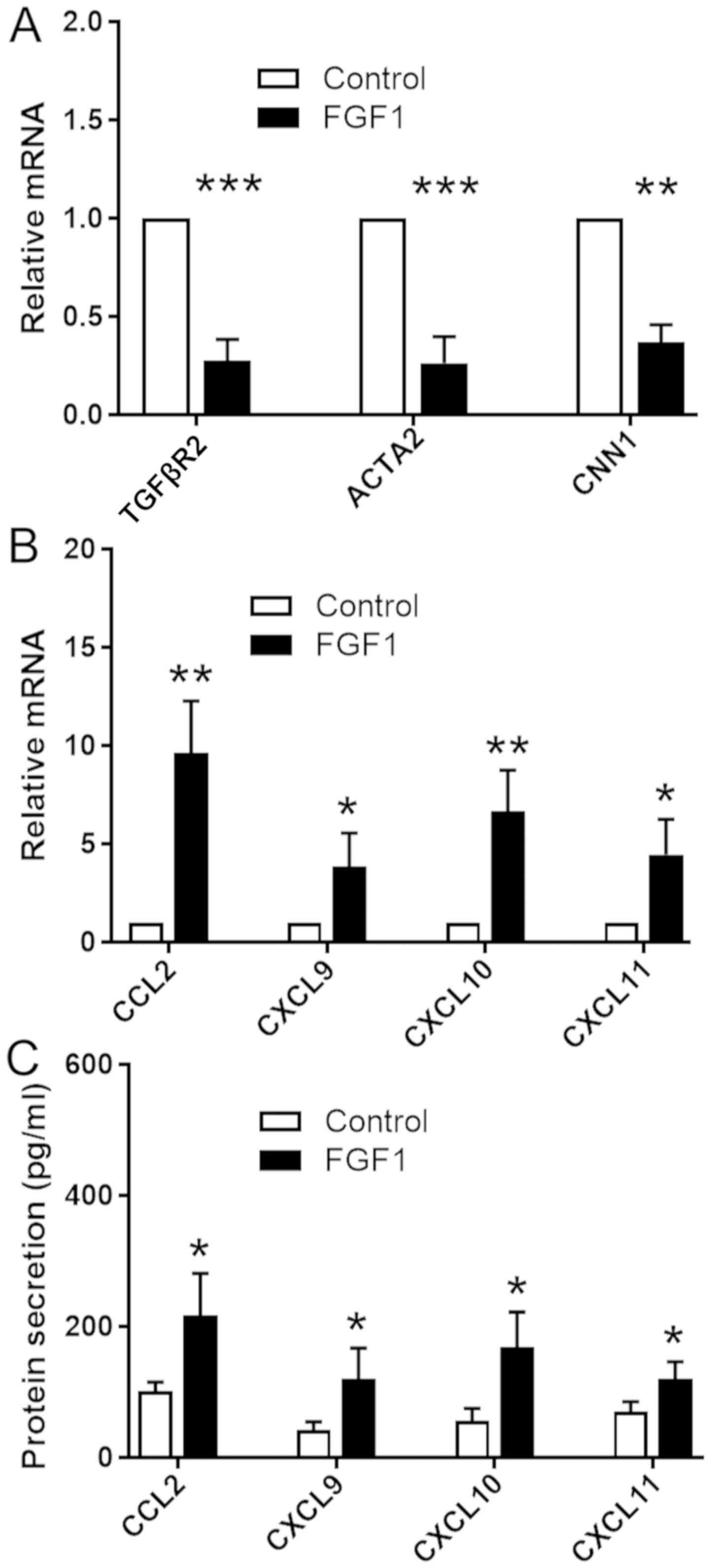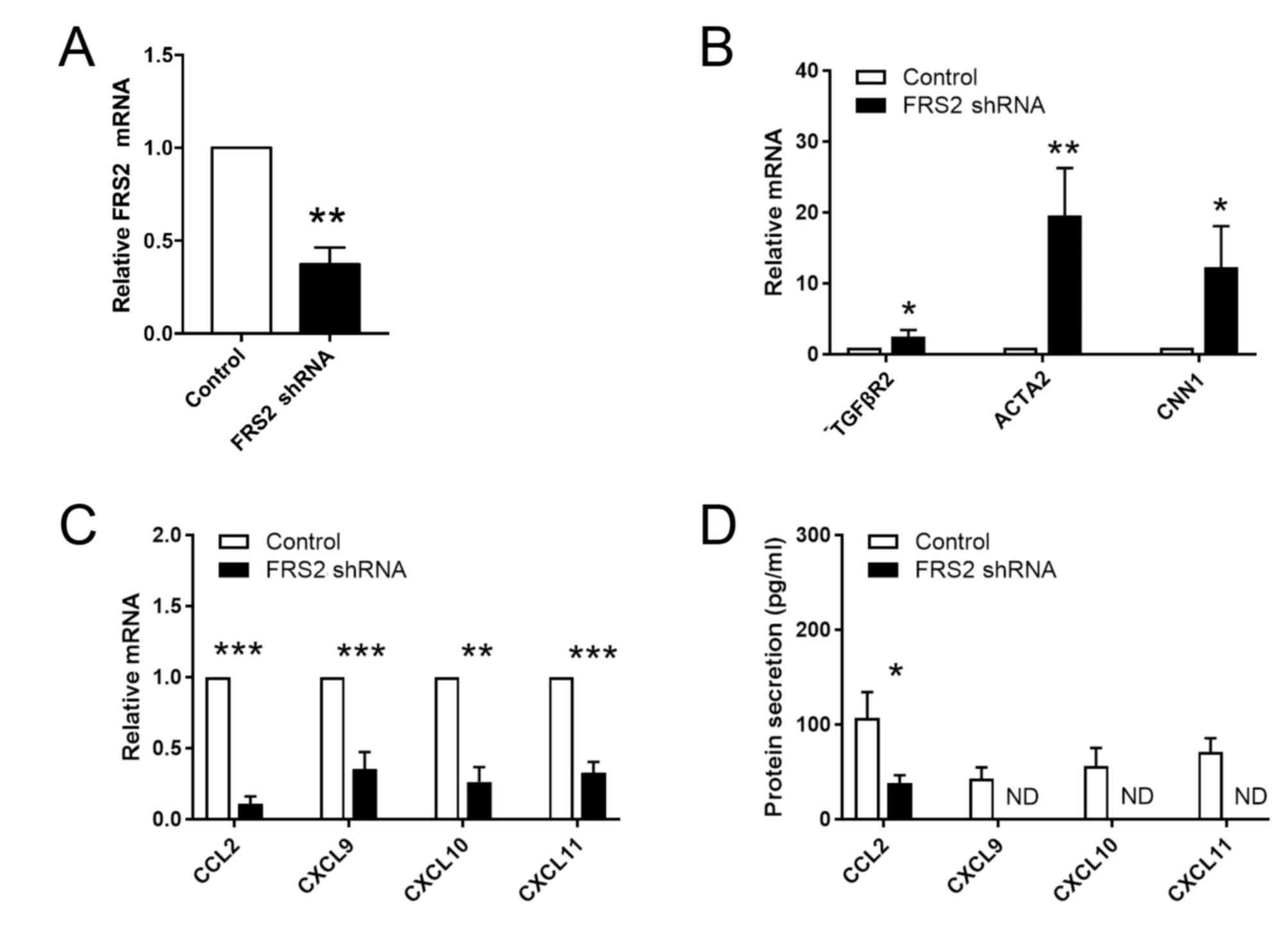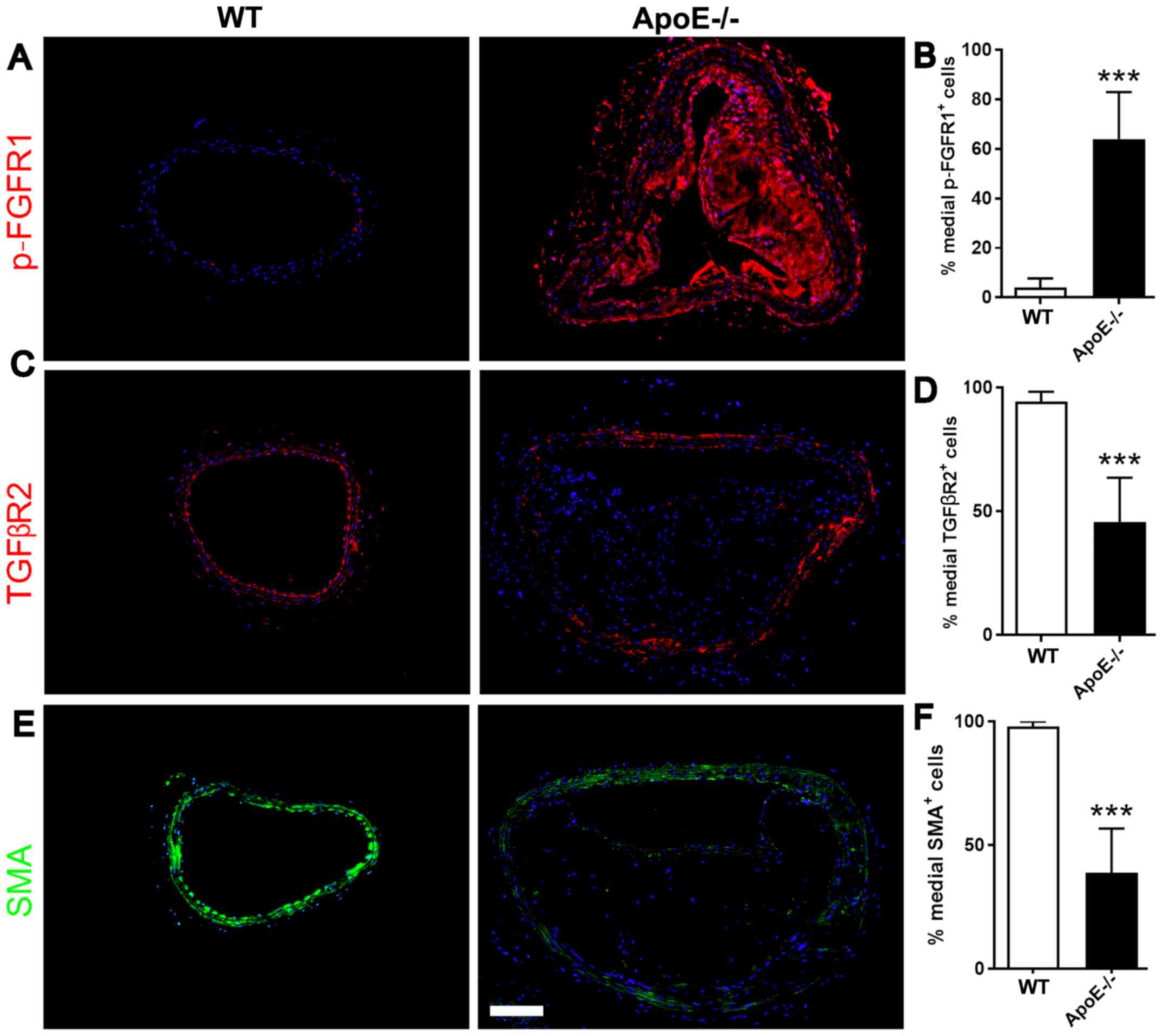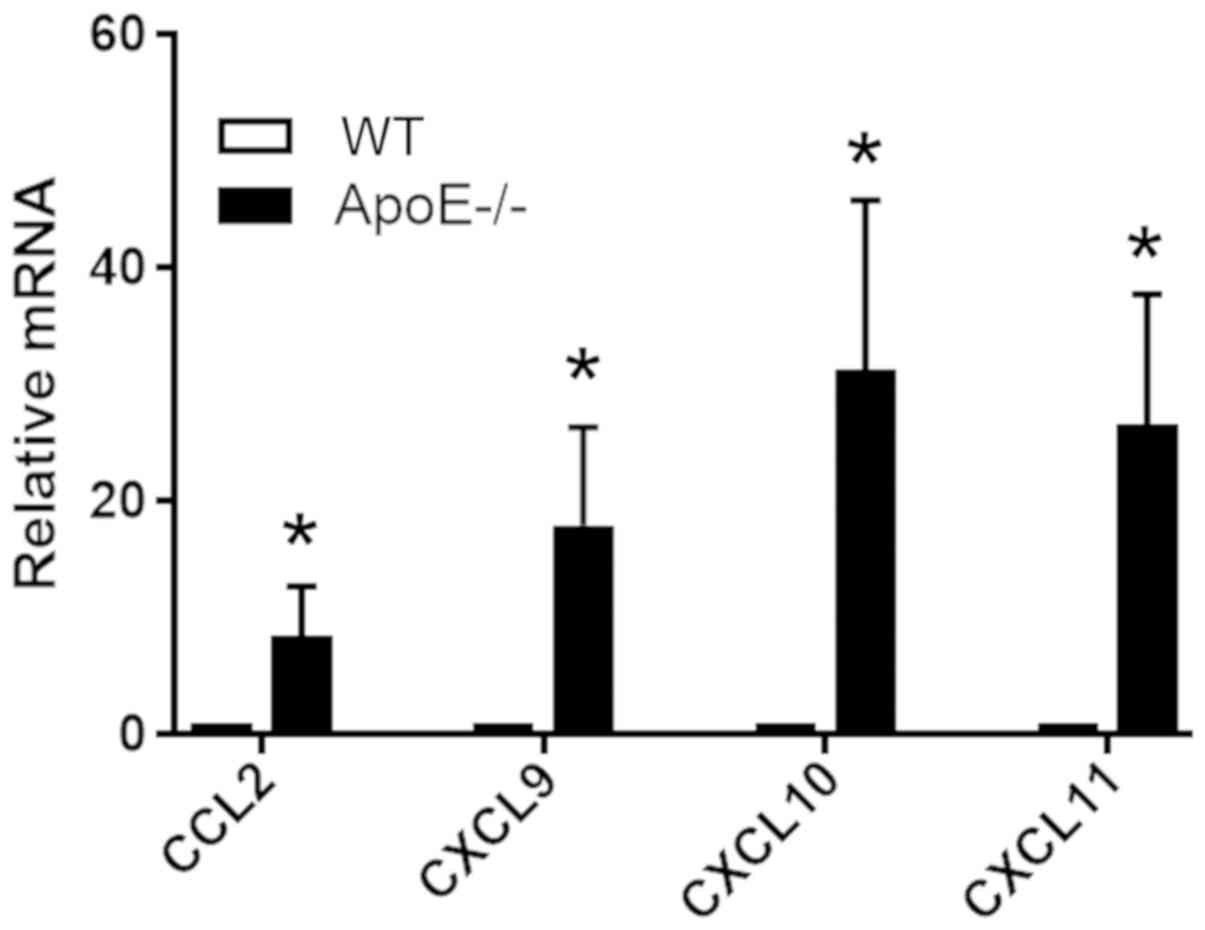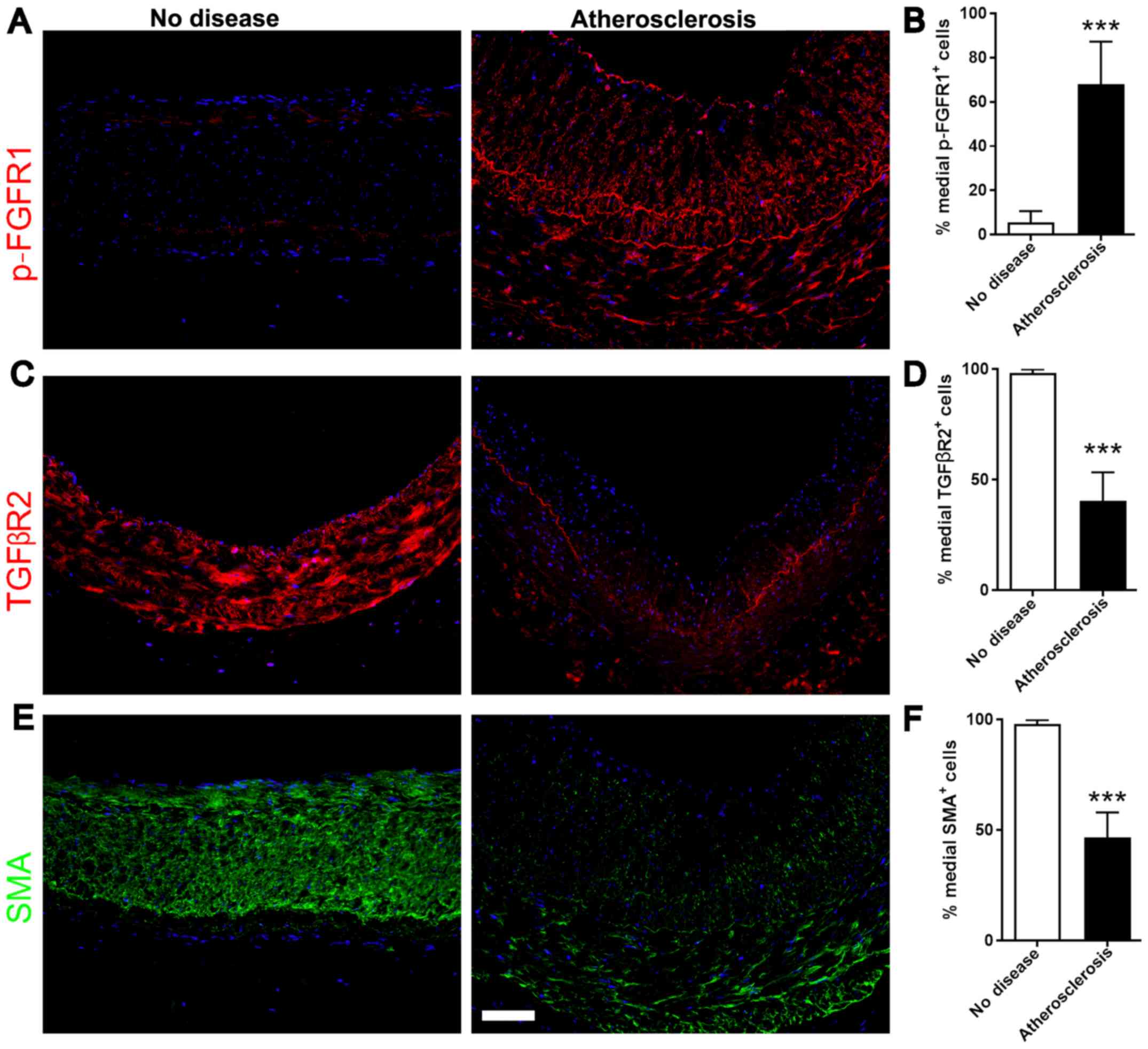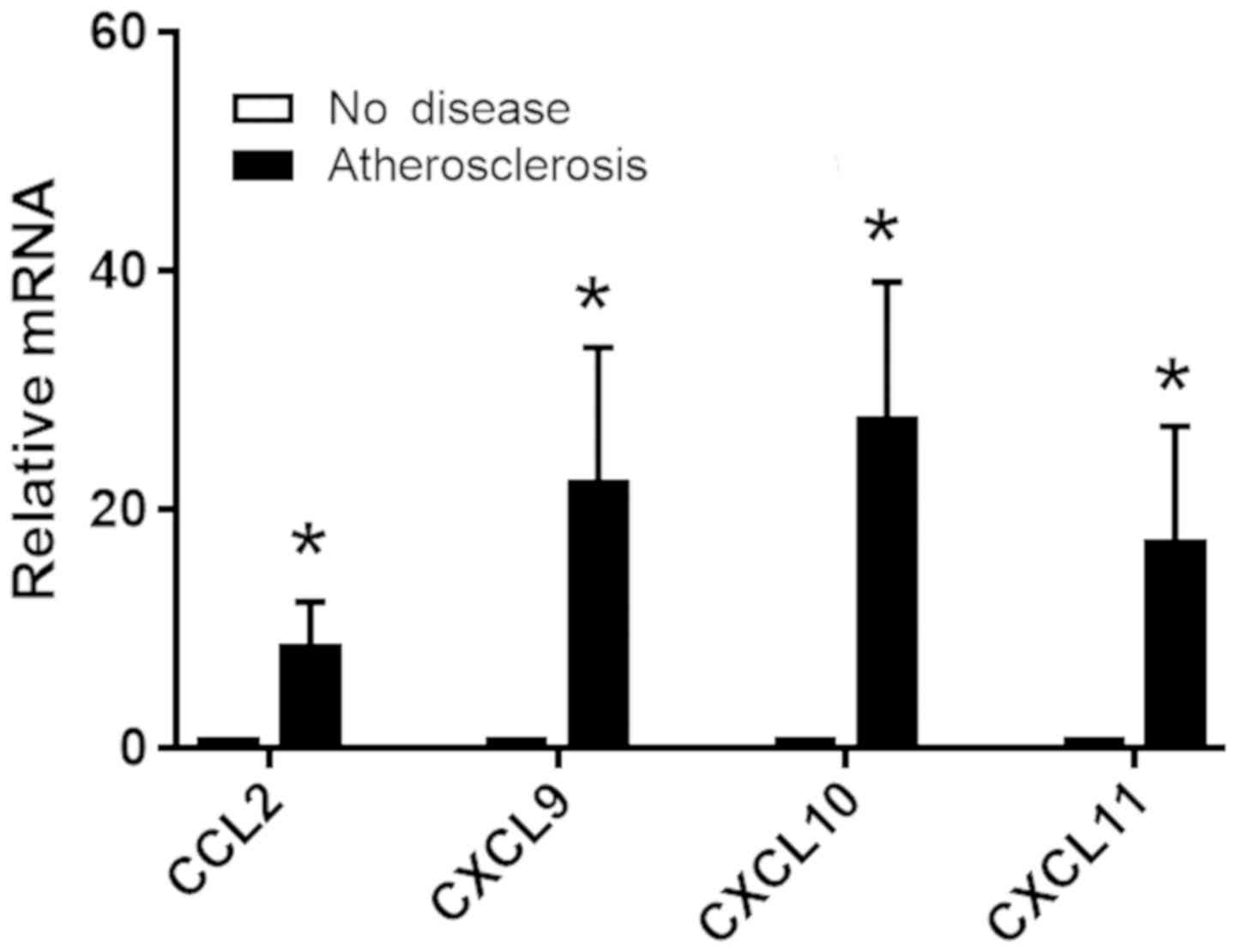|
1
|
Libby P, Ridker PM and Hansson GK:
Progress and challenges in translating the biology of
atherosclerosis. Nature. 473:317–325. 2011. View Article : Google Scholar : PubMed/NCBI
|
|
2
|
Sanz J and Fayad ZA: Imaging of
atherosclerotic cardiovascular disease. Nature. 451:953–957. 2008.
View Article : Google Scholar : PubMed/NCBI
|
|
3
|
Bennett MR, Sinha S and Owens GK: Vascular
smooth muscle cells in atherosclerosis. Circ Res. 118:692–702.
2016. View Article : Google Scholar : PubMed/NCBI
|
|
4
|
Liu R, Leslie KL and Martin KA: Epigenetic
regulation of smooth muscle cell plasticity. Biochim Biophys Acta.
1849:448–453. 2015. View Article : Google Scholar : PubMed/NCBI
|
|
5
|
Burns WR, Wang Y, Tang PC, Ranjbaran H,
Iakimov A, Kim J, Cuffy M, Bai Y, Pober JS and Tellides G:
Recruitment of CXCR3+ and CCR5+ T cells and production of
interferon-gamma-inducible chemokines in rejecting human arteries.
Am J Transplant. 5:1226–1236. 2005. View Article : Google Scholar : PubMed/NCBI
|
|
6
|
Ahmad U, Ali R, Lebastchi AH, Qin L, Lo
SF, Yakimov AO, Khan SF, Choy JC, Geirsson A, Pober JS and Tellides
G: IFN-gamma primes intact human coronary arteries and cultured
coronary smooth muscle cells to double-stranded RNA- and
self-RNA-induced inflammatory responses by upregulating TLR3 and
melanoma differentiation-associated gene 5. J Immunol.
185:1283–1294. 2010. View Article : Google Scholar : PubMed/NCBI
|
|
7
|
Tellides G and Pober JS: Inflammatory and
immune responses in the arterial media. Circ Res. 116:312–322.
2015. View Article : Google Scholar : PubMed/NCBI
|
|
8
|
Kawai-Kowase K and Owens GK: Multiple
repressor pathways contribute to phenotypic switching of vascular
smooth muscle cells. Am J Physiol Cell Physiol. 292:C59–C69. 2007.
View Article : Google Scholar : PubMed/NCBI
|
|
9
|
Lindner V and Reidy MA: Proliferation of
smooth muscle cells after vascular injury is inhibited by an
antibody against basic fibroblast growth factor. Proc Natl Acad Sci
USA. 88:3739–3743. 1991. View Article : Google Scholar : PubMed/NCBI
|
|
10
|
Jackson CL and Reidy MA: Basic fibroblast
growth factor: Its role in the control of smooth muscle cell
migration. Am J Pathol. 143:1024–1031. 1993.PubMed/NCBI
|
|
11
|
Chen PY, Qin L, Barnes C, Charisse K, Yi
T, Zhang X, Ali R, Medina PP, Yu J, Slack FJ, et al: FGF regulates
TGF-β signaling and endothelial-to-mesenchymal transition via
control of let-7 miRNA expression. Cell Rep. 2:1684–1696. 2012.
View Article : Google Scholar : PubMed/NCBI
|
|
12
|
Chen PY, Qin L, Tellides G and Simons M:
Fibroblast growth factor receptor 1 is a key inhibitor of TGFβ
signaling in the endothelium. Sci Signal. 7:ra902014. View Article : Google Scholar : PubMed/NCBI
|
|
13
|
Chen PY, Qin L, Baeyens N, Li G, Afolabi
T, Budatha M, Tellides G, Schwartz MA and Simons M:
Endothelial-to-mesenchymal transition drives atherosclerosis
progression. J Clin Invest. 125:4514–4528. 2015. View Article : Google Scholar : PubMed/NCBI
|
|
14
|
Chen PY, Qin L, Li G, Tellides G and
Simons M: Fibroblast growth factor (FGF) signaling regulates
transforming growth factor beta (TGFβ)-dependent smooth muscle cell
phenotype modulation. Sci Rep. 6:334072016. View Article : Google Scholar : PubMed/NCBI
|
|
15
|
Chen PY, Qin L, Li G, Tellides G and
Simons M: Smooth muscle FGF/TGFβ cross talk regulates
atherosclerosis progression. EMBO Mol Med. 8:712–728. 2016.
View Article : Google Scholar : PubMed/NCBI
|
|
16
|
Lebastchi AH, Khan SF, Qin L, Li W, Zhou
J, Hibino N, Yi T, Rao DA, Pober JS and Tellides G: Transforming
growth factor beta expression by human vascular cells inhibits
interferon gamma production and arterial media injury by
alloreactive memory T cells. Am J Transplant. 11:2332–2341. 2011.
View Article : Google Scholar : PubMed/NCBI
|
|
17
|
Livak KJ and Schmittgen TD: Analysis of
relative gene expression data using real-time quantitative PCR and
the 2(-Delta Delta C(T)) method. Methods. 25:402–408. 2001.
View Article : Google Scholar : PubMed/NCBI
|
|
18
|
Ornitz DM and Itoh N: The fibroblast
growth factor signaling pathway. Wiley Interdiscip Rev Dev Biol.
4:215–266. 2015. View
Article : Google Scholar : PubMed/NCBI
|
|
19
|
Chen PY, Simons M and Friesel R: FRS2 via
fibroblast growth factor receptor 1 is required for
platelet-derived growth factor receptor beta-mediated regulation of
vascular smooth muscle marker gene expression. J Biol Chem.
284:15980–15992. 2009. View Article : Google Scholar : PubMed/NCBI
|
|
20
|
Kouhara H, Hadari YR, Spivak-Kroizman T,
Schilling J, Bar-Sagi D, Lax I and Schlessinger J: A lipid-anchored
Grb2-binding protein that links FGF-receptor activation to the
Ras/MAPK signaling pathway. Cell. 89:693–702. 1997. View Article : Google Scholar : PubMed/NCBI
|
|
21
|
Eswarakumar VP, Lax I and Schlessinger J:
Cellular signaling by fibroblast growth factor receptors. Cytokine
Growth Factor Rev. 16:139–149. 2005. View Article : Google Scholar : PubMed/NCBI
|
|
22
|
Gotoh N: Regulation of growth factor
signaling by FRS2 family docking/scaffold adaptor proteins. Cancer
Sci. 99:1319–1325. 2008. View Article : Google Scholar : PubMed/NCBI
|
|
23
|
Hughes SE: Localisation and differential
expression of the fibroblast growth factor receptor (FGFR)
multigene family in normal and atherosclerotic human arteries.
Cardiovasc Res. 32:557–569. 1996. View Article : Google Scholar : PubMed/NCBI
|
|
24
|
Zhou J, Tang PC, Qin L, Gayed PM, Li W,
Skokos EA, Kyriakides TR, Pober JS and Tellides G: CXCR3-dependent
accumulation and activation of perivascular macrophages is
necessary for homeostatic arterial remodeling to hemodynamic
stresses. J Exp Med. 207:1951–1966. 2010. View Article : Google Scholar : PubMed/NCBI
|
|
25
|
Yu L, Qin L, Zhang H, He Y, Chen H, Pober
JS, Tellides G and Min W: AIP1 prevents graft arteriosclerosis by
inhibiting interferon-γ-dependent smooth muscle cell proliferation
and intimal expansion. Circ Res. 109:418–427. 2011. View Article : Google Scholar : PubMed/NCBI
|
|
26
|
Rao RM, Yang L, Garcia-Cardena G and
Luscinskas FW: Endothelial-dependent mechanisms of leukocyte
recruitment to the vascular wall. Circ Res. 101:234–247. 2007.
View Article : Google Scholar : PubMed/NCBI
|
|
27
|
Qin L, Huang Q, Zhang H, Liu R, Tellides
G, Min W and Yu L: SOCS1 prevents graft arteriosclerosis by
preserving endothelial cell function. J Am Coll Cardiol. 63:21–29.
2014. View Article : Google Scholar : PubMed/NCBI
|
|
28
|
Charo IF and Taubman MB: Chemokines in the
pathogenesis of vascular disease. Circ Res. 95:858–866. 2004.
View Article : Google Scholar : PubMed/NCBI
|
|
29
|
Tabas I and Glass CK: Anti-inflammatory
therapy in chronic disease: Challenges and opportunities. Science.
339:166–172. 2013. View Article : Google Scholar : PubMed/NCBI
|
|
30
|
He C, Medley SC, Hu T, Hinsdale ME, Lupu
F, Virmani R and Olson LE: PDGFRβ signalling regulates local
inflammation and synergizes with hypercholesterolaemia to promote
atherosclerosis. Nat Commun. 6:77702015. View Article : Google Scholar : PubMed/NCBI
|
|
31
|
Boring L, Gosling J, Cleary M and Charo
IF: Decreased lesion formation in CCR2-/- mice reveals a role for
chemokines in the initiation of atherosclerosis. Nature.
394:894–897. 1998. View
Article : Google Scholar : PubMed/NCBI
|
|
32
|
Gerszten RE, Garcia-Zepeda EA, Lim YC,
Yoshida M, Ding HA, Gimbrone MA Jr, Luster AD, Luscinskas FW and
Rosenzweig A: MCP-1 and IL-8 trigger firm adhesion of monocytes to
vascular endothelium under flow conditions. Nature. 398:718–723.
1999. View Article : Google Scholar : PubMed/NCBI
|
|
33
|
Zheng Y, Qin L, Zacarías NV, de Vries H,
Han GW, Gustavsson M, Dabros M, Zhao C, Cherney RJ, Carter P, et
al: Structure of CC chemokine receptor 2 with orthosteric and
allosteric antagonists. Nature. 540:458–461. 2016. View Article : Google Scholar : PubMed/NCBI
|
|
34
|
Veillard NR, Steffens S, Pelli G, Lu B,
Kwak BR, Gerard C, Charo IF and Mach F: Differential influence of
chemokine receptors CCR2 and CXCR3 in development of
atherosclerosis in vivo. Circulation. 112:870–878. 2005. View Article : Google Scholar : PubMed/NCBI
|
|
35
|
Heller EA, Liu E, Tager AM, Yuan Q, Lin
AY, Ahluwalia N, Jones K, Koehn SL, Lok VM, Aikawa E, et al:
Chemokine CXCL10 promotes atherogenesis by modulating the local
balance of effector and regulatory T cells. Circulation.
113:2301–2312. 2006. View Article : Google Scholar : PubMed/NCBI
|
|
36
|
Zernecke A, Bot I, Djalali-Talab Y,
Shagdarsuren E, Bidzhekov K, Meiler S, Krohn R, Schober A,
Sperandio M, Soehnlein O, et al: Protective role of CXC receptor
4/CXC ligand 12 unveils the importance of neutrophils in
atherosclerosis. Circ Res. 102:209–217. 2008. View Article : Google Scholar : PubMed/NCBI
|
|
37
|
Schwarz JB, Langwieser N, Langwieser NN,
Bek MJ, Seidl S, Eckstein HH, Lu B, Schömig A, Pavenstädt H and
Zohlnhöfer D: Novel role of the CXC chemokine receptor 3 in
inflammatory response to arterial injury: Involvement of mTORC1.
Circ Res. 104:189–200. 2009. View Article : Google Scholar : PubMed/NCBI
|
|
38
|
Tavakolian Ferdousie V, Mohammadi M,
Hassanshahi G, Khorramdelazad H, Khanamani Falahati-Pour S, Mirzaei
M, Allah Tavakoli M, Kamiab Z, Ahmadi Z, Vazirinejad R, et al:
Serum CXCL10 and CXCL12 chemokine levels are associated with the
severity of coronary artery disease and coronary artery occlusion.
Int J Cardiol. 233:23–28. 2017. View Article : Google Scholar : PubMed/NCBI
|















